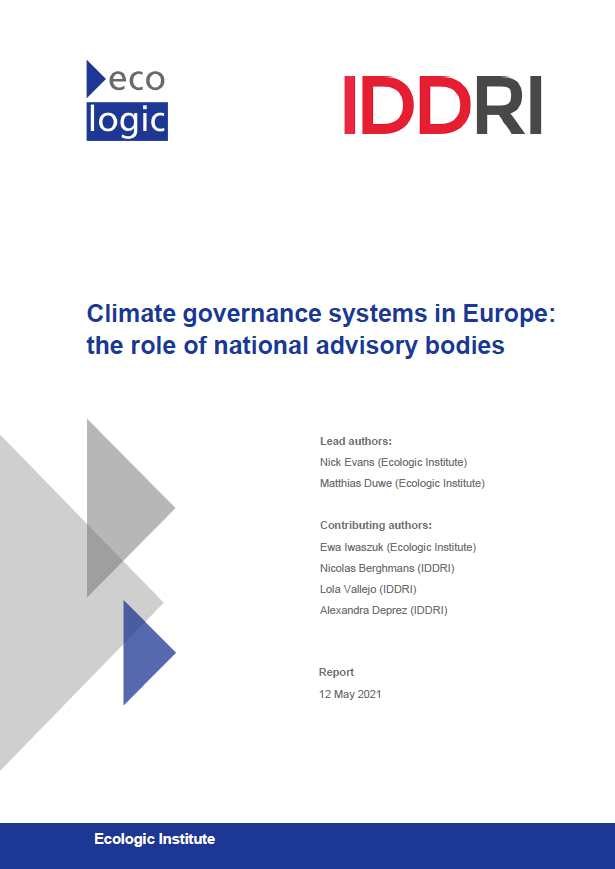Climate Governance Systems in Europe: the role of national advisory bodies
- Publication
- Citation
Evans, Nick; Matthias Duwe (2021): 'Climate governance systems in Europe: the role of national advisory bodies'. Ecologic Institute, Berlin; IDDRI, Paris.
The number of scientific climate advisory bodies is growing rapidly across European countries, including the establishment of one at the EU-level. Under the right conditions, such expert councils can help governments not only make the right climate policy decisions but also hold them accountable by boosting transparency and tracking the success (or failures) of national actions.
Governments across Europe have their own specific systems for climate policy-making. Some are laid down in law with significant detail on procedures, institutional arrangements and mechanisms for both monitoring and outside input. Dedicated national advisory bodies, especially in the form of independent scientific climate councils, are both a sign of and an important enabler for more robust climate governance. They tend to operate in highly formalized and specific governance systems, but also require regular and specific governance mechanisms in order to function effectively.
Download full report | EEA summary briefing
An analysis of these institutions and their underlying governance contexts suggests that the effectiveness of any advisory body depends strongly on the quality of the system it is working in. In addition, a detailed look at scientific expert councils revealed that their composition, their mandate and the resources they have available all influence the extent to which they can inform policy-making.
This report by Ecologic Institute and IDDRI, commissioned by the European Environment Agency (EEA), provides a comprehensive mapping of climate advisory bodies in European countries and the national governance systems in which they operate. It proposes a typology to account for the diversity of advisory bodies and a three-tiered frame by which to evaluate national climate policy-making systems. The research was based on an in-depth investigation of national policy documents and structured interviews with country experts.
Key insights:
- National climate policy systems in Europe differ in terms of their degree of formality, specificity and accountability. The analysis identified three main tiers into which existing systems fall. The first tier countries only include essential elements required by EU or international law ('EU/UN Baseline'); while the second and third tier countries have additional functionality specific to national policy cycles, increasing the windows of opportunity for expert and stakeholder involvement ('light framework' and 'robust framework'). Increasingly, European countries have turned to national framework laws to organize climate actions, often establishing supporting advisory institutions.
- In total, the research found 57 advisory bodies operating in 27 European countries. These can be categorized based on their composition and degree of autonomy into four different groups: (1) 'independent, scientific councils', (2) 'in-house scientific advisory bodies', (3) 'stakeholder engagement platforms' and (4) 'stakeholder and/or inter-ministerial roundtables'.
- Ten countries have established independent scientific councils dedicated specifically to climate (i.e., Type 1a advisory bodies). Each council's ability to influence policy formulation is a function of their mandate (specific responsibilities and windows to be involved) and the capacity they are given (through staff and means to create visibility). Without a clear and visible role and proper resources, impact is low.
- Despite capacity and contextual limitations, they play a unique role, exercising a combination of watchdog, reliable information provider and convener/stakeholder outreach functions. Experience from across Europe suggests that they can be positioned to enhance the accountability of a national governance system.
A preliminary version of the report was used as input for a two-day virtual workshop with representatives of national climate advisory bodies that took place on 12 and 19 November 2020. Workshop participants were invited to comment on the ongoing research and the virtual discussions provided invaluable insight into how advisory bodies operate on the ground to influence national policy-making. Most importantly, the dialogue uncovered an appetite for further exchange and the need for coordinated and cross-boundary solutions to unlock effective solutions for the transition to a climate neutral Europe.




